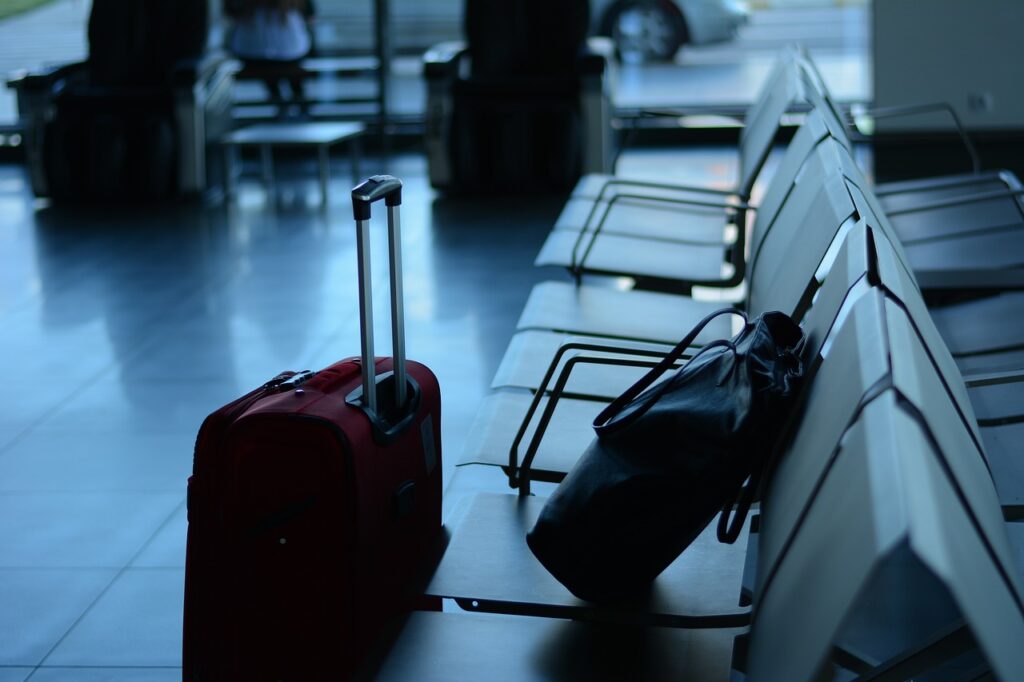Last Updated on April 3, 2024 by ETC Team

Whether you’re traveling to faraway destinations or just across the country, travel insurance can safeguard your journey against many unfortunate scenarios. It can also be expensive, difficult to file claims, and not always cover the things you thought it would — or should.
In this article, we’ll describe the important travel insurance pros and cons, along with what a travel insurance policy covers — and doesn’t cover. We’ll also provide a rough estimate of how much to budget for travel insurance costs, and where to find the best deals for every type of journey.
What is Travel Insurance?
Travel insurance is a type of policy that covers an individual while traveling domestically or internationally. These short-term insurance policies were designed to safeguard your journey against flight delays, lost luggage, the unfortunate mishap, or a serious medical emergency. All scenarios where travel insurance could save the day — or the entire trip.
Why Should I Purchase Travel Insurance?
The number one reason to purchase travel insurance is to ensure you won’t lose your money over a trip cancellation. Many travel carriers, cruise lines, and tour operators offer nominal reimbursements for last-minute cancellations – making it important to read the fine print.
Moreover, many foreign countries are increasingly requiring visitors to carry a travel insurance policy before entering. A travel insurance policy can also reimburse your costs if you have to cancel your trip for any of the covered reasons detailed in your policy. Again, read the fine print.
Lastly, before purchasing a travel insurance policy, check with your credit card company. Many travel rewards cards cover some, or all of the cost of travel cancellations or disruptions, lost luggage, and other issues that may occur.
What Does Travel Insurance Cover?

Most travel insurance policies will cover trip interruptions, lost, stolen, or damaged luggage – some may even cover damages to your rental car. Here’s a general list of what coverage your policy might provide:
- Airline cancellation
- Baggage loss or delay
- Emergency evacuation
- Hijaking
- Lost passport services
- Medical costs and evaluations
- Missed connections / departures
- Personal accident or injury
- Prescription eyeglass replacement
- Trip cancellation
- Trip changes
What Travel Insurance Doesn’t Cover?
A travel insurance policy won’t cover some activities or circumstances, including the following:
- Dental treatments
- Injuries incurred from participation in extreme activities that involve the risk of serious injury or death
- Injuries incurred from participation in a professional sporting event
- Medical-related travel expenses
- Injuries incurred from learning how to fly a plane
- Pregnancy-related treatment
- Pre-existing conditions
How Much Does Travel Insurance Cost?

Travel insurance policy costs vary widely, but a general rule of thumb is to budget 4-10% of the value of your trip. For example, if you’ve invested $5K into your vacation, your travel insurance policy might add an extra $250-$500 to the overall cost of the trip, depending on the level of coverage.
Additional factors affecting the cost of travel insurance include the number and age of travelers, points of departure and destination, length of stay, and type of coverage requested. Any pre-existing medical conditions must be divulged and may or may not be covered, or only at an additional cost. No matter what level of travel insurance you decide to get, when planning your travel budget, you will have to consider the cost.
How Does Travel Insurance Work?
Should something unfortunate happen during your trip like an injury, illness, a severe weather event, or an individual is required to return to work, a travel insurance policy can reimburse the remaining cost of the trip, as well as cover medical expenses (up to the limit of the policy) for the insured.
How Do I File a Travel Insurance Claim?
Filing a claim is similar to filing a vehicle damage or home insurance claim. Should you experience any event that results in trip cancellation (or curtailment), you’ll need documentation to support your claim, e.g. hospital receipts, airline confirmation of cancellation, or employer verification, to expedite your claim reimbursement.
Pro tip: Be sure to print out your travel insurance documents and carry them with your passport or other identification papers. They contain important contact information for domestic and international travelers.
Pros of Purchasing Travel Insurance
The top reason for purchasing travel insurance is simply peace of mind. However, beyond resting easy, a travel insurance policy ensures you won’t lose the entire cost of a long-planned vacation or any other travel plans.
Here are some other good reasons to purchase travel insurance for your next adventure. Depending on your policy, travel insurance will:
- Compensate for most trip cancellations or interruptions, in most circumstances
- Compensate for lost, stolen, or damaged luggage (including computers and cameras)
- Cover medical expenses (see any pre-existing condition clauses that may apply to you)
Think of travel insurance more as an investment. You worked hard, saved, and planned for a well-deserved vacation. Should a catastrophic weather event occur at your destination, and your travel plans are dashed, a travel insurance policy ensures you won’t lose your entire investment.
Cons of Purchasing Travel Insurance
While many of us are traveling on a shoestring, most see the added expense of travel insurance as its biggest barrier. There are other reasons besides the expense not to purchase a travel insurance policy — your claim may not be accepted, and there’s lots of loopholes.
Included in the list of what your travel insurance policy does not cover, are injuries due to participation in extreme activities. Some insurance companies consider breaking an ankle while walking as an “extreme activity.”
- It can be expensive
- May contain loopholes regarding pre-existing conditions
- May contain vague language as to what types of activities are covered in the event of an accident, e.g. cycling, skydiving, kayaking, surfing, etc.
- Claims may be rejected
Be sure to choose a policy that will cover your lifestyle or activities. If you’re traveling for a bicycle touring holiday make sure your policy will cover the cost of medical treatments, or evacuation, in the event of a serious accident.
Do I need Travel Insurance?

Travel insurance is meant to provide some peace of mind. And, although not a necessity, at least for domestic travel, unfortunate mishaps can not only ruin your trip but cost you more money in the long run.
Keep in mind, all insurance policies come with specific terms, conditions, exclusions, and benefits. Reading the fine print BEFORE purchasing your policy will help you to understand what’s covered in your policy should you need to use it — and the high probability of recouping some, if not all — of your travel costs investment.
Where Can I Purchase Travel Insurance?
There are numerous reputable online travel insurance companies and bundlers. Services like AARDY take the guesswork out of the search by offering side-by-side comparisons of top-rated travel insurance policies.
The Wrap

Travel insurance makes sense if you want to protect the amount of money you’ve laid out for your vacation. But no one can blame you if you’re hesitant to add another expense to your travel budget after paying for airfare, hotels, meals and activities. Still, if you can’t afford to lose the non-refundable money you’ve paid, travel insurance can be a smart investment.




[…] you want to reduce the stress of an upcoming trip, purchase travel insurance to help cover you in case of unexpected emergencies. This peace of mind can will help while […]